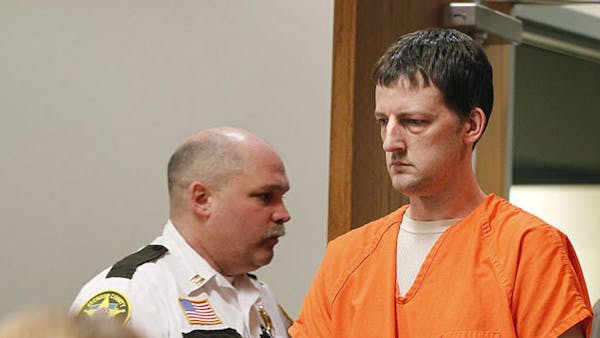Hudson, Wis. – Jessica Schaffhausen is hyperventilating on the 911 recording, barely able to utter desperate words between her frantic, squeaky breaths:
"My ex-husband just called and said he killed my kids!" she yelled to the dispatcher amid sobs, repeating her River Falls home address. "Please send somebody over!"
The chilling audio engrossed a St. Croix County courtroom full of jurors and spectators Tuesday, as Aaron Schaffhausen's insanity trial began.
Someone in the gallery gasped. Several jurors sat with their hands near their mouths. Aaron Schaffhausen stared straight ahead, occasionally shifting in his chair as the audio played for a half-hour.
The recording capped a morning of contrasting portrayals of Schaffhausen by the opposing attorneys. For the defense, Schaffhausen was a man so unglued that he couldn't control his actions. The prosecution described him as calculating in carrying out a plan to hurt his ex-wife in the worst way possible.
Schaffhausen, who was living in North Dakota, had shown up unexpectedly that day. Though he had threatened Jessica and the kids and others before, he seemed to have calmed down, according to statements by attorneys. Jessica wanted her children to have an involved father and agreed to let him visit the children on that sunny, warm July day, attorneys said.
Jessica Schaffhausen stayed on the phone with the operator while she drove panicked from the Twin Cities toward River Falls that afternoon.
"Oh my God I'm so ... stupid," she cries on the 911 recording.
The dispatcher asked if there were weapons in the house and if her ex-husband had given any other indications of violence.
"He just broke down crying and hung up," Jessica said.
Aaron Schaffhausen admitted last week to killing the couple's three children, 11-year-old Amara, 8-year-old Sophie and 5-year-old Cecilia. His attorneys Tuesday began their task of trying to convince a jury that he shouldn't be held responsible for the crimes because he had a mental disease or defect.
In opening statements, defense attorney John Kucinski portrayed Schaffhausen as depressed, despondent and increasingly obsessed after his divorce early last year. Kucinski said Schaffhausen's family, including his ex-wife, had worried about him and urged him to get treatment.
But prosecutor Gary Freyberg portrayed Schaffhausen as extremely intelligent, angry and jealous. Schaffhausen knew exactly what he was doing before, during and after the crime, Freyberg told the jury: "He decided that the way to make Jessica suffer the longest and the harshest would be to kill the things she loved best."
Both attorneys said Schaffhausen had made threats in the months before the murders, at one point telling Jessica on the phone that he wanted to come to River Falls, tie her up and make her choose which of the girls to kill so that she would understand the hurt and pain he was feeling.
They also said he called a cousin in the middle of the night and told her he had thoughts of cutting his girls' throats and once drove half way to River Falls to do that but turned around. He made threats about killing Jessica to co-workers and friends in North Dakota, they said.
Kucinski said Schaffhausen described being in a dreamlike state while at the girls' River Falls house that day.
"When he's with Cecilia, something happens. He doesn't recall what happened ... why it happened. All he recalls is he's choking the little one," Kucinski said. "The next thing he recalls, there's a lot of blood, the girls' throats are cut ... he describes it as if it's kind of a dream. So he sees things happening. He sees himself pouring gas, in his mind he's thinking of suicide."
Without offering details, Kucinski said his client had an extremely rare and complex psychological condition.
Kucinski said Jessica and Aaron met in college in Mankato and married after she got pregnant.
When they lived in River Falls in recent years, Aaron Schaffhausen took college classes in chemistry and physics but unexpectedly quit one day, just as he had done with previous jobs, Kucinski said. That irritated Jessica and he spiraled into deeper depression, playing video games, drinking and not engaging with his family, Kucinski said. She considered divorce but didn't act on it until he was back working — this time in North Dakota — and taking medication, getting his life in order.
The couple divorced and on Jan. 9, 2012, reached an agreement that neither of them could remarry for six months.
Afterward, his behavior became more erratic, Kucinski said. He called his ex-wife incessantly and she urged him to get help, stop obsessing about her and work on being a good dad.
Freyberg said Schaffhausen had told other people he thought of killing his kids to get back at his ex-wife, because she would then have to live with that grief for the rest of her life. He made threats both while sober and drunk, Freyberg said.
In the weeks before the murders, he appeared to calm down, Freyberg said. He even registered with an online dating service, and went fishing with buddies.
"We know now ... that he was still thinking homicidal thoughts," Freyberg said. "He was just hiding them."
The marriage restriction contained in the divorce expired July 9. The next day, Aaron Schaffhausen killed his three daughters.
Freyberg conceded that Schaffhausen was depressed, but said he wasn't out of touch with reality in any way. Obsessed with getting Jessica back, he viewed the girls as objects that he could use to get to her, Freyberg said.
"He killed because he wanted to kill," Freyberg said.
For the defense to win an insanity plea, 10 of 12 jurors must be convinced that, because of a mental disease or defect, Schaffhausen lacked substantial capacity either to appreciate the wrongfulness of his conduct or to conform his conduct to the requirements of law. A jury of nine women and six men were picked Monday to hear the case. Three will be excused before deliberations begin.
Three mental health experts are expected to testify — one each hired by the court, prosecutors and the defense — and all will agree Schaffhausen had a major depressive disorder at the time, Kucinski told the jury. But only the expert hired by the defense believes Schaffhausen fit the court's description of insanity, attorneys said.
"Nobody at all is to blame for what happened because nobody understood what was happening," Kucinski told the jury. "They had no way to know what was really going on in Aaron's head."
Pam Louwagie • 612-673-7102

FAFSA completions in Minnesota drop amid flawed efforts to update form

Wisconsin Republicans ignore governor's call to spend $125M to combat 'forever chemicals'

Man killed in Minnetonka by law enforcement started gun battle with deputies, BCA says

